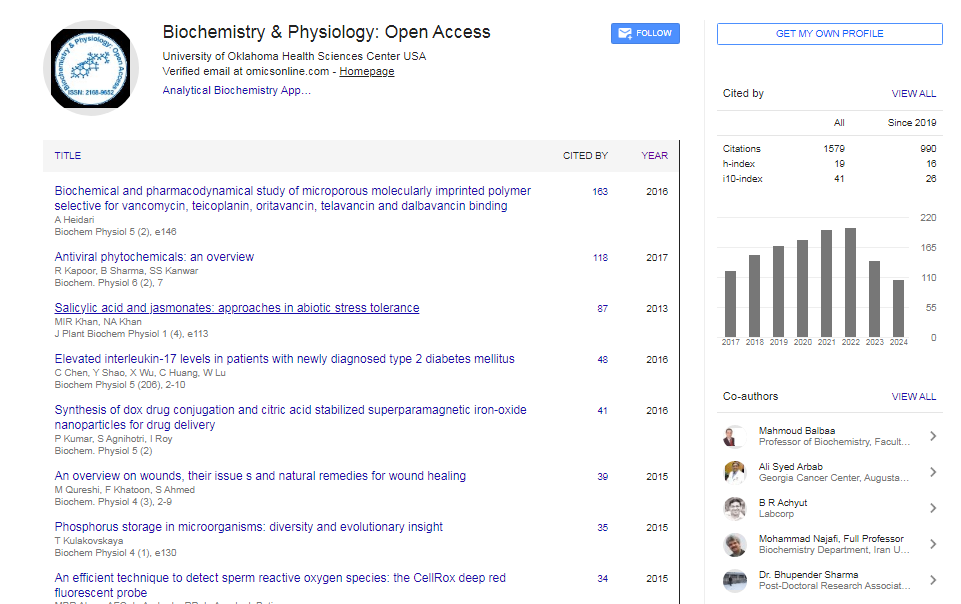Our Group organises 3000+ Global Conferenceseries Events every year across USA, Europe & Asia with support from 1000 more scientific Societies and Publishes 700+ Open Access Journals which contains over 50000 eminent personalities, reputed scientists as editorial board members.
Open Access Journals gaining more Readers and Citations
700 Journals and 15,000,000 Readers Each Journal is getting 25,000+ Readers
Google Scholar citation report
Citations : 1579
Biochemistry & Physiology: Open Access received 1579 citations as per Google Scholar report
Indexed In
- CAS Source Index (CASSI)
- Index Copernicus
- Google Scholar
- Sherpa Romeo
- Open J Gate
- Genamics JournalSeek
- Academic Keys
- JournalTOCs
- Ulrich's Periodicals Directory
- Electronic Journals Library
- RefSeek
- Directory of Research Journal Indexing (DRJI)
- Hamdard University
- EBSCO A-Z
- OCLC- WorldCat
- Scholarsteer
- SWB online catalog
- Virtual Library of Biology (vifabio)
- Publons
- Euro Pub
- ICMJE
Useful Links
Recommended Journals
Related Subjects
Share This Page
Justin W. Brown

Justin W. Brown
Department of Biology
James Madison University
USA
Biography
Justin Brown received his PhD in Physiology from East Carolina University where he explored the role of the hypothalamus in the hypothermic response to hemorrhagic shock in rats. His post-doctoral training at Dartmouth College focused on the role of brainstem serotonin on the thermoregulatory & cardiorespiratory responses to environmental stress during sleep in piglets as a model for Sudden Infant Death Syndrome (SIDS). He is now an associate professor at James Madison University in Harrisonburg VA where he teaches neuroscience & physiology/pathophysiology. He also maintains an active research program with graduate and undergraduate students, and collaborators at the US EPA (Chris Gordon PhD), in exploring the role of brainstem serotonin in the thermoregulatory and cardiovascular responses to exogenous stress in rats as a model for SIDS. His most recent work focuses on the role of ambient and/or preferred temperature in thermoregulatory stress and has implications in the wider field of animal care.
Research Interest
The role of brainstem serotonin in the thermoregulatory and cardiovascular responses to stress as a model for Sudden Infant Death Syndrome. The thermoregulatory responses to thermal stress in rodents – applications in animal care.

 Spanish
Spanish  Chinese
Chinese  Russian
Russian  German
German  French
French  Japanese
Japanese  Portuguese
Portuguese  Hindi
Hindi 
